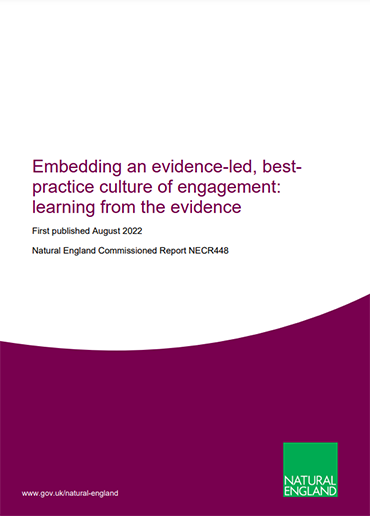10 recommendations for best practice stakeholder engagement
Dr Caitlin Hafferty is a postdoctoral researcher in environmental social science based at the Environmental Change Institute, University of Oxford. She is an expert in public and stakeholder engagement in environmental decision-making, and is passionate about championing the contributions of social sciences to nature recovery.
 I collaborated with Natural England to produce outputs for embedding an evidence-led, best practice culture of engagement. This included delivering recommendations which are useful for any organisation thinking about improving their strategy for public and stakeholder engagement.
I collaborated with Natural England to produce outputs for embedding an evidence-led, best practice culture of engagement. This included delivering recommendations which are useful for any organisation thinking about improving their strategy for public and stakeholder engagement.
The available evidence for best practice public and stakeholder engagement was reviewed in a report and summarised in an accompanying infographic pack. Engagement is a process by which members of the public (or other key stakeholders like local authorities, businesses, and charities) can become involved in decisions which affect their lives. Engagement is essential for healthy democracies and ensuring that people are at the heart of tackling environmental issues, helping us to make better decisions for more sustainable and equitable outcomes for everyone.
The outputs from this research are suitable for anyone who is thinking about engaging, including practitioners, practice enablers, researchers, and policy makers who aim to involve members of the public and other key stakeholders in decision-making processes. While this work was focused on engagement in environmental decision-making, it is more broadly relevant to other areas of research and practice.
The report provides the evidence behind what engagement is and why it is important, what the benefits are, the potential risks of ‘poor’ engagement and how to mitigate them, how different ‘types’ of engagement can provide useful classifications for practitioners, and how practitioners can use theory (i.e., different ways of thinking and knowing) to inform best practice. This includes the challenges and opportunities of engaging during COVID-19 and in an increasingly digitised world, particularly considering the ethical implications of digital technologies.
The report outlines how the available evidence can be used to inform the creation of an evidence-led, best-practice engagement culture. It outlines 10 recommendations which consider engagement strategies, frameworks, standards, models, methods, toolkits (and so forth).
One central message in this review is that ‘best practice’ engagement and its outcomes will vary between different situations. Practitioners should recognise that the quality of the process and outcomes will change depending on the purpose and objectives for engaging, as well as organisational cultures of engagement, institutional capacity, wider socio-economic and political contexts, and the characteristics of participants.
The 10 recommendations in the report are:
- Engagement is an ongoing process, not just a one-off activity.
- Take time to understand the local context in which engagement is being carried out.
- Engage stakeholders in dialogue as early as possible in the decision-making process.
- Recognise the importance of integrating local and scientific knowledge and implement this in practice.
- Manage power dynamics effectively, for example by using skilled facilitators who can help marginalised voices be heard and build trust in the process.
- Think about the length and time scale of the engagement process and how often it might be necessary to engage with participants.
- Recognise that different (digital/remote and in-person) tools and approaches for engagement will work differently in different situations.
- Engagement coordinators need to manage participants’ expectations of the engagement process.
- There are risks to engagement, some of which can be managed or mitigated.
- Frameworks for engagement need to be institutionalised within organisations as a culture of engagement.
Blog Originally posted on Caitlin Hafferty's website https://caitlinhafferty.co.uk/blog-2/. Reposted here with permission